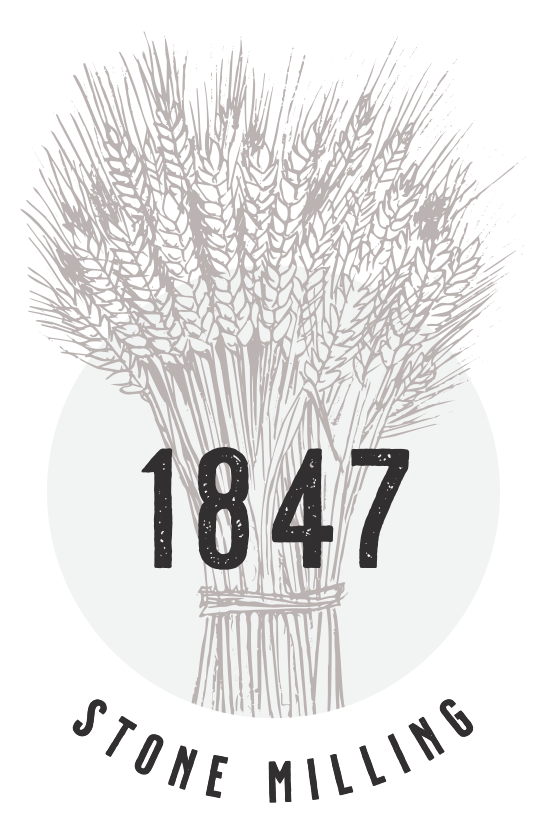Frequently Asked Questions
Why Choose 1847 Stone Milled Flour?
1847 Flours
- No Bleaching
- No Chemicals
- No Additives
- No Glyphosate
- No Fortification
- No Preservatives
- Organic Grains
- Stone Milled
- Local Grains
- Natural Vitamins
- Cold Milled
- Bran and Fiber
- Flavourful
- Freshly Milled Every Week
Conventional Flours
- Bleaching Agents
- Flour is chemically processed to increase flour volume
- Artificially fortified due to the removal and denaturing of naturally
- occurring vitamins and oils
- Conventional grains
- No Local focus
- Synthesized vitamins
- High temperature milling
- Fiber removed to extend shelf life
- Bland
- Hull removed before milling (many naturally occurring vitamins found)
- Extremely long shelf life
- Whole Berry Milled
Is your flour organic and Non-GMO?
Yes, all our flours are certified organic and NON-GMO, ensuring the highest quality ingredients for your baking.
What’s the best way to store flour?
To maintain freshness, store your flour in a cool, dark place away from direct sunlight and heat sources.
How long does your flour last?
Our flour typically lasts for about 6 months from the day it’s milled. The mill date is found on the package of your flour.
Can I store flour for longer periods?
Yes, if you’d like your flour to last over a year, consider placing it in an airtight bag and storing it in the freezer. This helps preserve its freshness and prevents it from going stale.
Do your flours contain iron or folic acid?
Our flours are unfortified therefore not enriched with iron, folic acid or additives of any kind, making them safe for individuals with the MTHFR gene.
Do your products contain nuts or sesame?
1847 Stone Milling is a nut, treenut, peanut, and sesame seed free facility.
Do you carry white flour?
No, we do not carry white flour. Our closest option is Daily Grind, which is not labeled as “All-Purpose” flour but can be used similarly. During our milling process, we don’t sift under 100 microns, retaining the germ in the flour. This ensures the flour retains all its natural vitamins without any fortification.
How does farm gate pickup work?
Place your order online and select the farm gate pickup option at checkout. Once your order is ready, you will receive an email notification. You can then pick up your order anytime, as our flour house is open 24/7, allowing you to collect your items at your convenience.
Do you offer farm tours?
At this time, we do not offer any farm or mill tours.
Can you buy flour at your location?
Yes, we offer farm gate pickup where you purchase your flour in advance online. Additionally, we have some flour available in our farmhouse if you wish to add to your order once you arrive at our location.
Where do your grains come from?
We try to source all our grains from local Ontario farmers. Some grains such as Kamut, don’t grow well in our Ontario climate. Those are sourced from Western Canada. All our grains are from Canadian farms. Our farm is currently in transition from conventional to organic. Our hope is to produce certified organic grains for milling.
Our grains are always Certified Organic!
What is the difference between fresh milled flour and bleached flour?
Fresh milled bread flour has different properties than bleached bread flour. Bleached literally means when the flour turns from a brown colour to white. Oxygen in the air reacts with the flour to turn it white. This natural oxidation process helps develop the gluten in the flour, making the dough stretchy. If you like a light fluffy loaf add 1tbsp of vital wheat gluten per cup of fresh milled flour. If you like a denser hearty loaf use the fresh milled bread flour as is! Another major difference is the taste. The oxidation process also tends to mellow the flavours of the grains.
Why do conventional flours chemically bleach their flour?
Before chemical bleaching was discovered mills used to let their flour sit for approximately 12 weeks to develop the gluten, through natural oxidation in from the air. Since the chemical bleaching process was discovered mills were able to mill and ship in a very short period of time without having to store the flour. This processes also removed all the great vitamins and minerals naturally found in the flour. This created the need to fortify the flour because it is such a staple in our diets.
Why cold stone milled?
By milling the entire grain at a very low temperature we retain all the naturally occurring vitamins, minerals and oils. No need to fortify! Conventional mills superheat their grains and remove the hull before milling to increase the volume/yield and maintain a long shelf life.


